 Giải toán 10, giải bài tập toán lớp 10 đầy đủ đại số và hình học
Giải toán 10, giải bài tập toán lớp 10 đầy đủ đại số và hình học
 Đề kiểm tra 15 phút - Chương 1 - Hình học 10
Đề kiểm tra 15 phút - Chương 1 - Hình học 10
Đề kiểm tra 15 phút - Chương 1 - Đề số 2 - Hình học 10
Đáp án và lời giải chi tiết Đề kiểm tra 15 phút - Chương 1 - Đề số 2 - Hình học 10
Đề bài
Chọn phương án đúng
Câu 1. Cho tam giác ABC với M, N, P lần lượt là trung điểm của các cạnh AB, AC, BC. Véc tơ đối của véc tơ \(\overrightarrow {MN} \) là
A.\(\overrightarrow {BP} \) B.\(\overrightarrow {MA} \)
C.\(\overrightarrow {PC} \) D.\(\overrightarrow {PB} \)
Câu 2. Cho ba điểm A, B, C phân biệt. Đẳng thức nào sau đây là sai ?
A.\(\overrightarrow {AB} - \overrightarrow {BC} = \overrightarrow {AC} \)
B.\(\overrightarrow {AB} + \overrightarrow {BC} = \overrightarrow {AC} \)
C.\(\overrightarrow {BC} + \overrightarrow {AB} = \overrightarrow {AC} \)
D.\(\overrightarrow {BC} - \overrightarrow {BA} = \overrightarrow {AC} \)
Câu 3. Cho hình bình hành ABCD có tâm O. Khi đó ta có
A.\(\overrightarrow {AO} - \overrightarrow {BO} = \overrightarrow {BA} \)
B.\(\overrightarrow {OA} - \overrightarrow {OB} = \overrightarrow {BA} \)
C.\(\overrightarrow {OA} - \overrightarrow {OB} = \overrightarrow {AB} \)
D.\(\overrightarrow {AO} + \overrightarrow {BO} = \overrightarrow {AB} \)
Câu 4. Cho hình vuông ABCD. Khi đó ta có
A.\(\overrightarrow {AB} = - \overrightarrow {BC} \)
B.\(\overrightarrow {AD} = - \overrightarrow {BC} \)
C.\(\overrightarrow {AC} = - \overrightarrow {BD} \)
D.\(\overrightarrow {AD} = - \overrightarrow {CB} \)
Câu 5. Cho hai điểm phân biệt M, N. Điều kiện cần và đủ để P là trung điểm của đoạn MN là
A\(\overrightarrow {PM} = - \overrightarrow {PN} \)
B.\( PM=PN\)
C.\(\overrightarrow {PM} = \overrightarrow {PN} \)
D.\(\overrightarrow {MP} = \overrightarrow {NP} \)
Câu 6. Cho G là trọng tâm của tam giác ABC và M là trung điểm của đoạn BC. Đẳng thức nào sau đây sai ?
A.\(\overrightarrow {GA} + \overrightarrow {GB} + \overrightarrow {GC} = \overrightarrow 0 \)
B.\(\overrightarrow {AB} + \overrightarrow {AC} = 2\overrightarrow {AM} \)
C.\(\overrightarrow {GB} + \overrightarrow {GC} = 2\overrightarrow {GM} \)
D.\(\overrightarrow {BM} + \overrightarrow {MC} = \overrightarrow 0 \)
Câu 7. Gọi I là giao điểm của hai đường chéo của hình bình hành ABCD. Khi đó
A.\(\overrightarrow {AI} = \dfrac{1 }{ 2}\overrightarrow {AB} + \dfrac{1 }{ 2}\overrightarrow {AC} \)
B.\(\overrightarrow {AI} = \dfrac{1 }{3}\overrightarrow {AB} + \dfrac{1 }{3}\overrightarrow {AD} \)
C.\(\overrightarrow {AI} = \dfrac{1 }{2}\overrightarrow {AB} + \dfrac{1 }{ 2}\overrightarrow {AD} \)
D.\(\overrightarrow {AI} = \dfrac{1 }{ 2}\overrightarrow {AB} + \overrightarrow {BI} \)
Câu 8. Cho tam giác ABC. Gọi M là điểm trên đoạn BC sao cho MB = 2MC.
Khi đó
A.\(\overrightarrow {AM} = \dfrac{1 }{ 3}\overrightarrow {AB} + \overrightarrow {AC} \)
B.\(\overrightarrow {AM} = \dfrac{1 }{3}\overrightarrow {AB} + \dfrac{2 }{ 3}\overrightarrow {AC} \)
C.\(\overrightarrow {AM} = \dfrac{1 }{3}\overrightarrow {AB} + \dfrac{1 }{ 3}\overrightarrow {AC} \)
D.\(\overrightarrow {AM} = \dfrac{1 }{3}\overrightarrow {AB} + 2\overrightarrow {AC} \)
Câu 9. Cho tam giác đều ABC có cạnh bằng a, M là trung điểm của BC. Véc tơ \(\overrightarrow {CA} - \overrightarrow {MC} \) có độ lớn là
A.\(\dfrac{{3a}}{2}\)
B. \(\dfrac{a}{2}\)
C. \(\dfrac{{2a\sqrt 3 }}{3}\)
D. \(\dfrac{{a\sqrt 7 }}{2}\)
Câu 10. Cho tam giác ABC vuông tại B có AB = 3cm, BC = 4cm. Độ dài của véctơ tổng \(\overrightarrow {AB} + \overrightarrow {AC} \) là
A.\(\sqrt {13} \)cm
B. \(13\) cm
C. \(2\sqrt {13} \) cm
D. \(26\) cm
Lời giải chi tiết
Câu 1.D
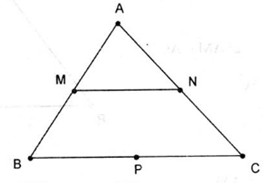
Véctơ đối của véctơ \(\overrightarrow {MN} \) là véctơ \(\overrightarrow {PB} \) .
Câu 2.A.
Ta có \(\overrightarrow {AB} - \overrightarrow {AC} = \overrightarrow {CB} \)
\(\Rightarrow \overrightarrow {AC} = \overrightarrow {AB} - \overrightarrow {CB} \ne \overrightarrow {AB} - \overrightarrow {BC} \)
Câu 3.B
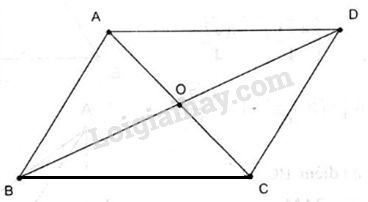
Theo quy tắc của phép trừ ta có \(\overrightarrow {OB} - \overrightarrow {OA} = \overrightarrow {AB} \) .
Câu 4. D
ABCD là hình vuông nên \(\overrightarrow {AD} = \overrightarrow {BC} = - \overrightarrow {CB} \)
Câu 5.A.
Ta có P là trung điểm \(MN \Leftrightarrow \overrightarrow {PM} + \overrightarrow {PN} = 0 \)
\(\Leftrightarrow \overrightarrow {PM} = - \overrightarrow {PN} \) .
Câu 6.D
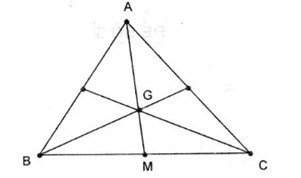
Ta có \(\overrightarrow {BM} + \overrightarrow {MC} = \overrightarrow {BC} \ne \overrightarrow 0 \) .
Câu 7.C
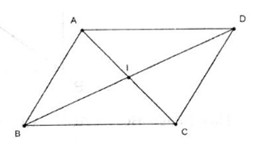
Ta có: \(\overrightarrow {AB} + \overrightarrow {AD} = 2\overrightarrow {AI} \)
Suy ra \(\overrightarrow {AI} = \dfrac{1 }{ 2}\overrightarrow {AB} + \dfrac{1 }{ 2}\overrightarrow {AD}\)
Câu 8.B
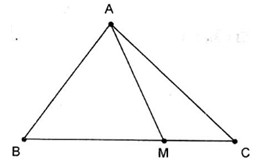
Ta có \(\overrightarrow {BM} = \overrightarrow {AM} - \overrightarrow {AB} ,\) \({\rm{ }}\overrightarrow {CM} = \overrightarrow {AM} - \overrightarrow {AC} \).
Mà \(\overrightarrow {BM} = - 2\overrightarrow {CM} \) .
Suy ra \(\overrightarrow {AM} - \overrightarrow {AB} = - 2\left( {\overrightarrow {AM} - \overrightarrow {AC} } \right)\) .
\( \Rightarrow 3\overrightarrow {AM} = \overrightarrow {AB} + 2\overrightarrow {AC} \)
\( \Rightarrow \overrightarrow {AM} = \dfrac{1 }{ 3}\overrightarrow {AB} +\dfrac{2 }{3}\overrightarrow {AC} \)
Câu 9. D
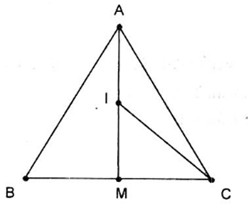
Gọi I là trung điểm AM.
Tam giác ACM vuông tại M nên theo Pitago ta có:
\(AM = \sqrt {A{C^2} - M{C^2}} \)
\(= \sqrt {{a^2} - {{\left( {\frac{a}{2}} \right)}^2}} = \frac{{a\sqrt 3 }}{2} \)
\(\Rightarrow MI = \frac{1}{2}AM = \frac{{a\sqrt 3 }}{4}\)
Ta có \(\overrightarrow {CA} - \overrightarrow {MC} = \overrightarrow {CA} + \overrightarrow {CM} = 2\overrightarrow {CI} .\)
\(\eqalign{
& CI = \sqrt {C{M^2} + M{I^2}} \cr
&= \sqrt {{{\left( {\frac{a}{2}} \right)}^2} + {{\left( {\frac{{a\sqrt 3 }}{4}} \right)}^2}} \cr
& = \frac{{a\sqrt 7 }}{4}. \cr} \)
Vậy \(\left| {\overrightarrow {CA} - \overrightarrow {MC} } \right| = \left| 2{\overrightarrow {CI} } \right| = 2CI = {{a\sqrt 7 } \over 2}.\)
Câu 10. C
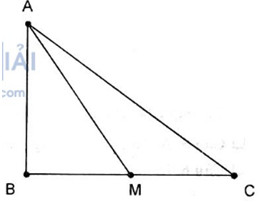
Gọi M là trung điểm BC. Ta có \(\overrightarrow {AB} + \overrightarrow {AC} = 2\overrightarrow {AM} \) .
Mà \(AM = \sqrt {A{B^2} + B{M^2}} \)\(\, = \sqrt {9 + 4} = \sqrt {13} \) cm.
Vậy \(\left| {\overrightarrow {AB} + \overrightarrow {AC} } \right| = \left| {2\overrightarrow {AM} } \right| \)\(\,= 2AM = 2\sqrt {13} \) cm.
Loigiaihay.com












Danh sách bình luận